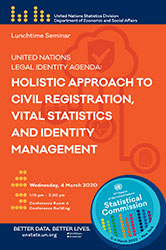United Nations Statistical Commission
Overview 51st Session (2020) Side Events
Lunchtime Seminar
UNITED NATIONS LEGAL IDENTITY AGENDA:
HOLISTIC APPROACH TO CIVIL REGISTRATION, VITAL STATISTICS AND IDENTITY MANAGEMENT
- Wednesday, 4 MAR 2020
- 1:15 – 2:30 pm
- Conference Room 4
Meeting organized by United Nations Statistics Division
Everyone has the right to be recognized as a person before the law, as enshrined in Article 6 of the Universal Declaration on Human Rights and several international human rights instruments.1 To address this, the 2030 Agenda for Sustainable Development, agreed by all member states in September 2015, established a specific target within the Sustainable Development Goals (SDGs) - Target 16.9 - legal identity for all.
Recognizing that the issue of legal identity for all is of paramount importance for fulfilling the Sustainable Development Agenda, the United Nations Deputy Secretary-General initiated the establishment of the United Nations Legal Identity Expert Group (UN LIEG) in September 2018, cochaired by the Department of Economic and Social Affairs of the UN Secretariat (UN DESA), United Nations Development Programme (UNDP) and the United Nations Children's Fund (UNICEF)
As civil registration provides an official record of the existence of the person and the recognition of that individual before the law, it has been the fundamental means of granting legal identity.2 Furthermore, civil registration is recognized as the ultimate source for production of comprehensive, regular and reliable vital statistics.3
Working closely with the World Bank, the UN LIEG developed the operational United Nations definition of legal identity. Legal identity is defined as the basic characteristics of an individual's identity, e.g. name, sex, and place and date of birth, conferred through registration and the issuance of a certificate by an authorized civil registration authority following the occurrence of birth. In the absence of birth registration, legal identity may be conferred by a legally-recognized identification authority; this system should be linked to the civil registration system to ensure a holistic approach to legal identity from birth to death. Legal identity is retired by the issuance of a death certificate by the civil registration authority upon registration of death.
On the basis of this definition, the UN LIEG developed and introduced the United Nations Legal Identity Agenda (UN LIA), which consists of the holistic approach to ensure complete civil registration and universal registration of all vital events, the production of regular, comprehensive and accurate vital statistics, and the establishment and maintenance of population registers and identity management apparatus from birth to death. There should be full interoperability between these functions in a simultaneous manner, in accordance with international standards and recommendations.
A strategy paper on achieving legal identity for all4, the UN County Team Operational Guidelines for Implementation of UN LIA at the national level5 and the communication and advocacy strategy including the Handbook on Civil Registration, Vital Statistics and Identity Management Systems: Communication for Development6 were further developed to support the one UN approach of implementing the UN LIA at the country level.
Organized by UNSD, in collaboration with the other two co-chairs of UNLIA TF, UNICEF and UNDP, and UN ECA which is responsible for UN LIA implementation in pilot countries in Africa, this side event provides an opportunity for national statistical offices, international organizations and delegates of Permanent Missions to acquire a more detailed overview in respect of this new UN Agenda, in addition to the documents provided to the 51st Session of the UN Statistical Commission that will discuss the introduction of the holistic approach to civil registration, vital statistics and identity management.
-
13:15 - 13:20
1. Welcoming remarks:
- Mr. Srdjan Mrkic, UNSD
-
13:20 - 13:35
2. Introduction of UN LIA
-
UNLIA Secretariat
Mr. Srdjan Mrkic, UNSD
Mr. Niall McCann, UNDP
Ms. Kirsten Di Martino, UNICEF
-
UNLIA Secretariat
-
13:35 - 13:50
3. Reporting the progress of country implementation and the future work plan
- Mr. Oliver Chinganya, UNECA
-
13:50 - 13:55
4. Second Ministerial Conference on Civil Registration and Vital Statistics in Asia and the Pacific
- Ms. Gemma Van Halderen, ESCAP
-
13:55 - 14:00
5. Supporting UN LIA
- Swiss Agency for Development and Cooperation
-
14:00 - 14:05
6. Supporting UN LIA
- DFID
-
14:05 - 14:10
7. Technical assistance on CRVS
- Ms. Olga Joos, CDC Foundation
-
14:10 - 14:30
8. Q & A
Agenda
1 1948 Universal Declaration of Human Rights, Articles 6 and 15; 1951 Convention on the Status of Refugees, Articles 25 and 27; 1954 Convention on the Status of Stateless Persons, Articles 25 and 27; 1961 Convention on the Reduction of Statelessness, Articles 1-4; 1965; 1969 International Convention on the Elimination of All Forms of Racial Discrimination, Article 5(d)(iii); 1966 International Covenant on Civil and Political Rights, Article 24; 1979 Convention on the Elimination of All Forms of Discrimination Against Women, Article; 1989 Convention on the Rights of the Child, Articles 7-8; 1990 International Convention on the Protection of the Rights of all Migrant Workers and Members of their Families, Article 29; 2006 Convention on the Rights of Persons with Disabilities, Article 18.
2 Principles and Recommendations for a Vital Statistics System, United Nations publication Sales Number E.13.XVII.10, New York, 2014, paragraph 286.
3 Principles and Recommendations for a Vital Statistics System, United Nations publication Sales Number E.13.XVII.10, New York, 2014, paragraph 279.
4 https://unstats.un.org/unsd/statcom/51st-session/documents/BG-Item3k-Overview-E.pdf
5 https://unstats.un.org/legal-identity-agenda/documents/UNCT_Guidelines.pdf
6 https://unstats.un.org/unsd/demographic-social/Standards-and-Methods/files/Handbooks/crvs/CRVS-IdM-E.pdf
